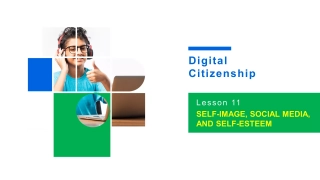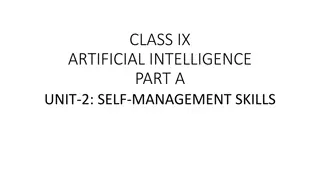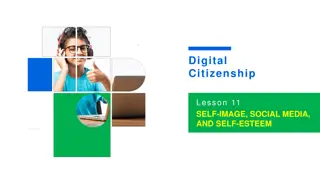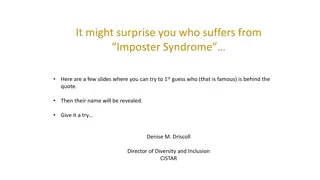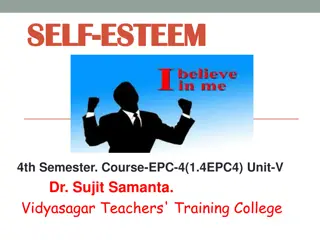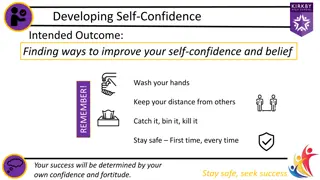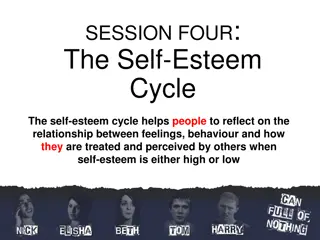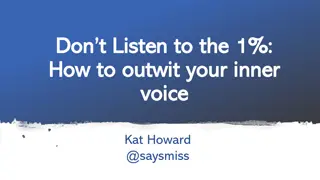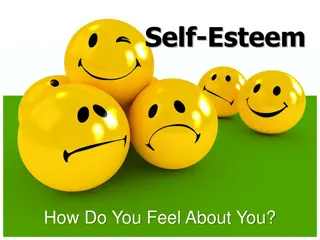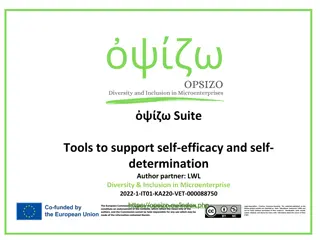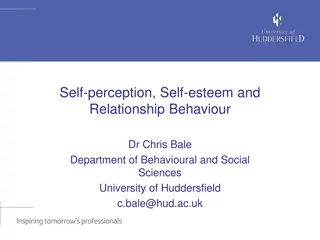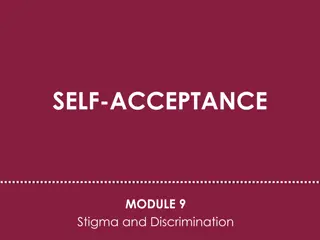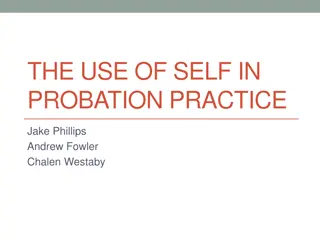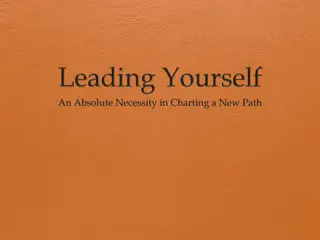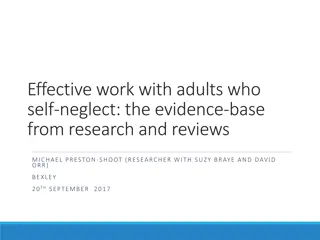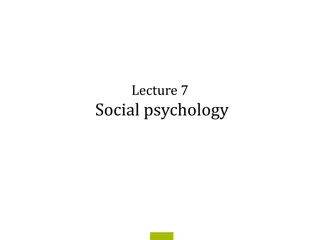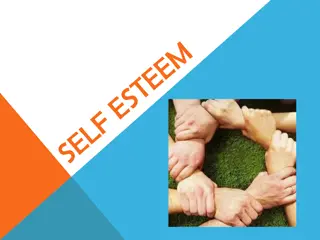Digital Citizenship: Self-Image, Social Media, and Self-Esteem
Explore the impact of social media on self-image and self-esteem. Learn about the influence of filters and media on body perception. Reflect on self-assessment and take-home activities to improve self-confidence.
3 views • 11 slides
Enhancing Self-Management Skills for Personal Growth
Self-management skills are essential for regulating emotions, thoughts, and behaviors effectively. Understanding yourself, setting goals, and developing positive habits contribute to self-improvement. Positive results of self-management include proactivity, goal setting, and self-reinforcement. Stre
1 views • 9 slides
Understanding Self-Worth in Children: Building a Strong Foundation
Explore the importance of self-concept, self-esteem, and self-worth in children's development. Learn how parents can positively impact a child's self-perception and self-value through nurturing experiences. Discover the key sources influencing children's self-worth and the critical role of early lif
0 views • 30 slides
Understanding the Impact of Social Media on Self-Image and Self-Esteem
Explore the story of Tara, a 13-year-old girl whose experience with social media shapes her self-image and self-esteem. Delve into how social media can influence our perceptions of ourselves and others, affecting mental well-being and relationships. Understand the role of digital citizenship in navi
10 views • 11 slides
Self-Advocacy, Communication, and Research
Explore the essence of self-advocacy, communication, and research in this training module. Learn to articulate your needs effectively, acquire self-advocacy skills, and identify various settings where self-advocacy is crucial. Engage in activities to assess your self-advocacy skills and reflect on h
2 views • 35 slides
Famous Quotes on Imposter Syndrome - Can You Guess the Authors?
Discover famous quotes on imposter syndrome, try to guess the authors behind them, and learn how even well-known figures like Albert Einstein and Sonia Sotomayor have experienced feelings of inadequacy and self-doubt. Explore the prevalence of imposter syndrome and share your own experiences to crea
1 views • 7 slides
Understanding Self-Esteem: Meaning, Importance, and Types
Self-esteem is how we perceive our worth and value. High self-esteem leads to confidence and positivity, while low self-esteem can result in self-doubt and negative emotions. Self-esteem impacts mental health, behavior, decisions, relationships, and overall success in life. Recognizing and nurturing
2 views • 15 slides
Understanding Self-Esteem and Ways to Improve It
Self-esteem is our perception of ourselves, impacting how we navigate life. Healthy self-esteem fosters positivity, while low self-esteem can be detrimental. Various factors, like childhood experiences, contribute to low self-esteem, but steps can be taken to improve it. Building positive relationsh
0 views • 14 slides
Understanding the Self: Psychology's Focus and Implications
The field of psychology has long been intrigued by the concept of self, exploring its importance to well-being, self-esteem, and brain localization. Research reveals how excessive optimism, self-bias, and blindness to incompetence can impact self-esteem. Contrasting individualist and collectivist cu
1 views • 41 slides
Building Self-Confidence: Key Steps and Benefits
Understanding self-confidence, its importance, and how to develop it can lead to enhanced resilience, motivation, reduced fear and anxiety, and a stronger sense of self. Self-confidence allows for confident behavior, while lack of it can lead to self-doubt and avoidance of risks. Learning to embrace
0 views • 7 slides
The Importance of Self-Awareness in Personal Growth
Self-awareness is crucial for understanding one's character, feelings, and motivations. It helps in recognizing strengths and weaknesses, managing stress, improving communication, and fostering empathy. Developing self-awareness involves introspection, mindfulness, self-reflection, and seeking feedb
2 views • 47 slides
Developing a Self-Care Action Plan for Overall Well-Being
Self-care involves deliberate activities to nurture mental, emotional, physical, and spiritual health, yet it is often neglected. This guide explores the essence of self-care, emphasizes the importance of building a personalized self-care action plan, and provides insights into taking care of your b
0 views • 19 slides
Enhancing Self-Confidence for Professional Success
Understanding the importance of self-confidence in the workplace is crucial for personal growth and career advancement. Self-confident individuals trust their abilities, maintain a sense of control over their lives, and have realistic expectations. This summary delves into the characteristics of sel
0 views • 13 slides
Understanding the Self-Esteem Cycle: High vs Low Self-Esteem
The self-esteem cycle explores the interplay between one's feelings, behavior, and how they are treated based on their self-esteem level. High self-esteem is associated with positive feelings, supportive behavior, and positive interactions, while low self-esteem manifests in negative emotions, withd
9 views • 4 slides
Overcoming Imposter Syndrome: How to Outwit Your Inner Voice
Discover how to outsmart your inner critic and tackle imposter syndrome effectively. Learn about the common features of imposter syndrome and ways to take action to be braver and build integrity. Challenge perfectionism, self-doubt, and limiting beliefs to shape your own success story.
0 views • 4 slides
NIOS Admission Process: Advantages, Disadvantages, and Eligibility Criteria
National Institute of Open Schooling (NIOS) offers flexible study options, vocational courses, and open basic education programmes. Students can benefit from the ease of understanding syllabus, flexible exam scheduling, and digital learning materials. However, the downside includes limited real-time
0 views • 22 slides
Alisha's Journey: Overcoming Co-Dependency, Trauma, and Self-Doubt
Alisha shares her poignant journey of battling co-dependency, trauma, and self-worth struggles through a series of personal experiences including surviving tornadoes, facing abuse, and confronting deep-seated beliefs. Her narrative highlights resilience, self-discovery, and the quest for healing ami
0 views • 39 slides
Understanding the Test of Promotion in Christian Ministry
The Test of Promotion in Christian ministry is designed to assess and examine the attitudes, motives, and true inner beliefs of individuals called by God. It serves to identify those truly called, equip them with spiritual understanding, and test their faith for trustworthiness. Passing through this
1 views • 20 slides
Finding Confident Balance in Life: Embracing Ambition and Self-Identity
Embrace confident balance in life by prioritizing family, career, relationships, and personal growth. Avoid perfectionism and self-doubt, focus on what truly matters, and stay true to yourself. Seek support from friends, pursue opportunities that fulfill you, and be brave in your decisions for a ful
0 views • 19 slides
Overcoming Challenges and Pursuing Your Dreams
Facing obstacles such as lack of support from family, disapproval from parents, and self-doubt can hinder you from achieving your dream job. However, it is important to believe in yourself and take proactive steps to stay focused on your aspirations. By acknowledging your worth, respecting others' o
0 views • 13 slides
Enhancing Self-Regulation for Formative Assessment through Social and Emotional Learning
Explore the significance of self-regulation in formative assessment, understand key concepts like self-control, emotional competence, and perseverance. Discover actionable strategies to implement self-regulation interventions with students and train other adults effectively. Future orientation and s
0 views • 25 slides
Understanding Mindful Self-Judgment and Its Role in Mental Health
Mindful self-judgment is a complex concept that involves balancing self-awareness and self-compassion. While nonjudgment is a key aspect of mindfulness practices, there is a debate on whether mindful self-judgment can be appropriate and functional in certain circumstances. Researchers like June Pric
2 views • 46 slides
Understanding Self-Esteem: Highs and Lows
Self-esteem is the judgment we hold about ourselves, shaped by experiences and relationships. High self-esteem individuals embrace new encounters with confidence and positivity, while low self-esteem individuals struggle with self-doubt and criticism. Recognizing signs of low self-esteem is crucial
0 views • 11 slides
Enhancing Self-Regulation Skills in Children: Strategies and Tips
Understanding and fostering self-regulation in children is crucial for their development. Self-regulation involves controlling impulses, focusing, and shifting between tasks. This article delves into the internal mechanisms of self-regulation, such as executive function, and provides practical tips
1 views • 22 slides
Analysis of Du Bois' Use of Prejudice and Rhetorical Devices in 'Souls of Black Folk'
In W.E.B. Du Bois' "Souls of Black Folk," he explores the concept of prejudice and its impact on the African American community. Du Bois contrasts white Americans' perspective on prejudice as a defense of culture with the reality of how it humiliates and undermines African Americans. Through powerfu
0 views • 9 slides
The Owl's Mistake - A Story of Identity and Acceptance
Owl, in her quest to fit in, disguises herself as an eagle, hiding her true identity. Over time, she forgets herself and seeks validation from others. When her disguise is exposed, Owl faces self-doubt and learns to embrace her true self, growing wiser through the experience.
0 views • 8 slides
Boosting Your Child's Self-Esteem & Confidence in Parenting Workshop Series
Understanding self-esteem in children is crucial for their emotional development. Healthy self-esteem leads to positive behaviors, while low self-esteem can result in negative self-perceptions. Recognizing signs of healthy and unhealthy self-esteem allows parents to support and nurture their child's
0 views • 11 slides
Enhancing Self-Efficacy and Self-Determination in the Workplace
Establishing high levels of self-efficacy and self-determination in the workplace is crucial for accomplishing tasks and goals effectively. This publication explores the significance of these traits, providing strategies for managers to foster and maintain them. Discover why self-efficacy and self-d
0 views • 8 slides
Understanding Self-Perception, Self-Esteem, and Relationship Behavior
The discussion explores the impact of low self-esteem on various psychological issues, societal views on self-worth, self-perception biases, and the consequences of self-esteem in different aspects of life, backed by research and theories such as the Better-Than-Average Effect and Sociometer Theory.
0 views • 19 slides
Understanding Imposter Syndrome: Causes, Effects, and Overcoming Strategies
Imposter Syndrome is characterized by feelings of inadequacy despite evidence of success, chronic self-doubt, and fear of being exposed as a fraud. It affects individuals' work performance, leads to avoidance of additional duties, assigns success to external factors, and can result in burnout. Howev
0 views • 10 slides
Understanding Self-Acceptance and Overcoming Stigma
Self-esteem and self-acceptance are distinct concepts, with self-acceptance focusing on embracing all facets of oneself unconditionally. Developing self-acceptance involves stages like aversion, curiosity, tolerance, and allowing. Overcoming avoidance and resistance can lead to self-compassion and g
0 views • 10 slides
The Use of Self in Probation Practice: Understanding Self-Disclosure and Its Implications
Explore the concept of self-disclosure in probation practice, examining different methods, findings, and implications. Discover the two schools of thought regarding self-disclosure and delve into the various realms and subtypes of self-disclosure practices. Gain insights into the forms of self-discl
0 views • 25 slides
Understanding Leadership and Self-Leadership for Personal Development
Leadership is defined as an influence relationship between leaders and followers striving for real change. It involves self-awareness, self-management, and self-development. Self-leadership begins with understanding oneself, motives, and capabilities through self-awareness, ultimately leading to pur
0 views • 42 slides
The Story of Doubt, Healing, and Belief in Jesus
The story from John 9 tells of Jesus healing a man born blind, causing doubts and division among the people witnessing the miracle. Despite skeptics questioning the man's healing and Jesus' authority, the blind man and some recognized Jesus as a prophet. The Pharisees, continuing to doubt, sought co
0 views • 8 slides
Understanding Self-Neglect in Adults: Challenges and Research Insights
This content delves into the complex issue of self-neglect in adults, covering its definition, key challenges, and the research evidence available. It explores the various aspects of self-neglect, including neglect of self-care, domestic environment, and refusal of services. The challenges associate
0 views • 39 slides
Understanding the Self in Social Psychology
Delve into the concept of the individual and the self in social psychology, exploring how identities have evolved historically and the distinction between collective and individual selves. Learn about self-awareness, Wundt's differentiation of I and me, and Higgins' self-discrepancy theory, shedding
0 views • 84 slides
Assessing Credibility in Asylum Cases: Doubting and Believing Methodologies
Delve into the complexities of assessing credibility in asylum cases through the lenses of doubt and belief. Explore the Methodological Doubt and Belief Scale, navigate through real-world scenarios, and understand the nuances in evaluating refugee claims in a comprehensive manner.
0 views • 25 slides
Finding Peace and Faith in Times of Doubt and Adversity
Discover the message of peace and faith through verses from the Bible in the midst of doubt and adversity. Reflect on the importance of trusting in God's plan, seeking peace in prayer, and finding hope in the face of challenges. Let go of fear and uncertainty by embracing the peace that surpasses un
0 views • 22 slides
Correlation Between Self-Efficacy and Test Performance Based on International Assessment Data
Explore the correlation between self-efficacy, readiness to learn, intrinsic and extrinsic motivation with test performance using data from international assessments like PISA and PIAAC. Learn about the limitations of linear models in psychological research and the debate around self-efficacy accord
0 views • 32 slides
Boosting Self-Esteem: Benefits and Tips for Improvement
Understanding self-esteem, its benefits, and risks of low self-esteem are essential for personal growth. Developing high self-esteem can lead to increased self-respect, goal achievement, and willingness to try new things. On the other hand, low self-esteem can make individuals vulnerable to peer pre
0 views • 10 slides
